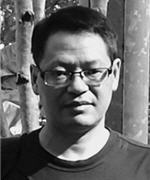|
|
 |
 |

剑男
Jian Nan
 
剑男(1966--),原名卢雄飞,湖北通城人,1988年毕业于华中师范大学中文系,上个世纪八十年代末开始文学创作。在《人民文学》《诗刊》等40余家报刊发表诗歌、小说、散文及评论,其诗歌入选各种选集及中学语文实验教材,著有《激愤人生》《散页与断章》《剑男诗选》。现在华中师范大学文学院任教,华中师范大学诗歌研究中心副主任,《语文教学与研究》杂志主编。
Jian Nan was born in 1966. His publications include poems, essays, novels and reviews. He has also been awarded several prizes for poetry. His poems have been anthologized in some books. He has published two poetry collections Random Pages and Fragmented Chapter and Collected Poems of Jian Nan. He is now teaching in a university.
|

|

译者
Translator
亦来
Yi Lai
 
亦来,诗人,翻译家,文学博士。1976年出生于湖北枝江,现任职于湖北某高校出版社。2000年至今在文学期刊发表诗作及译作若干,有诗歌译介到美国及荷兰。亦来,诗人,翻译家,文学博士。1976年出生于湖北枝江,现任职于湖北某高校出版社。2000年至今在文学期刊发表诗作及译作若干,有诗歌译介到美国及荷兰。
Yi Lai was born in 1976 in Zhijiang, China. He received his Ph.D. in Comparative literature. Now he is serving in a university-affiliated press. He has published about a hundred poems and poetry translations since 2000, among which some have been introduced to the United States and Holland.
|
 |
堂前燕 |
 |
Swallows |
在乡下,只有一种鸟会把窝建在人的家里
这么多年以来,很多鸟雀
都快要绝迹,只有这种鸟不惧人
仍然和人类保持着难得的信任
我们那里叫堂前燕,有的也叫观音燕
小小的脚、短短的喙,啄虫、啄草,也啄春泥
在幕阜山一带,燕子并不能被驯养
但人们都把它们当成家禽,它们小小的窝
建在墙壁上,和我们共一个大家庭
天黑关门时,人们总会关心燕子是否回家
秋天燕子南迁,去寻找更温暖的
阳光和田野,那个窝总是会被留着
像父母为出远门的孩子保留着他
|
|
In the countryside, only one kind of bird nests in human homes.
Over the years, many birds have become endangered
Except swallows, the only ones unafraid of people,
They still maintain a cherished trust of mankind.
We call them barn swallow here, or Guanyin Swallow.
With little feet and short beaks, they peck at bugs, peck at grass and peck at spring mud.
Around the Mubu Mountain area, swallows cannot be trained
But people treat them like pets. They build tiny nests
On the walls, and share the same big house with us.
At dusk,villagers check to see they've returned before closing the doors.
Swallows fly southward in autumn, seeking warmer
Sunlight and fields, but their nests are kept untouched,
Like rooms preserved by parents for their departed children...
|
 |
在废园 |
 |
In a Wasted Garden |
这是桃花,这是李花,这是苦楝
她蓄意张冠李戴,表明
这是她配享有的,从这座荒凉的
院落开始,所有的植物
都是一种植物,仅有的一树花可以是所有的花
这个天生弱盲的女孩,她多么有资格
把所有美丽的花草树木种在一起
我相信她看到了春天所有缤纷的色彩
比她瘦弱、矮小的母亲描绘的还要美
|
|
This is peach, this is plum, and this is chinaberry.
She intended to mix one with another, showing
That she deserved them all. After dwelling in
This wasted garden, all the plants have become
One plant, one single flower expanding into all flowers.
This girl with feeble sight was supremely qualified
To grow all beautiful flowers and trees together.
I believe she viewed the entire palette of spring colors,
Prettier than her thin, short mother had ever described them.
|
 |
在玻璃上写诗 |
 |
Write a Poem on a Window Pane |
早上醒来,窗外雪花纷飞
望不过去的故乡啊
我在布满水汽的玻璃上写字
我写积雪满弓刀,锋利的刀尖
被折断,反弹回来扎在我的胸膛
我写误了归期,一条消隐在深山的
小路立即在玻璃上浮起
我一边写,水汽一边弥散
似乎每一个字都缓缓流下泪水
我写村头的老枫杨,它流泪
我写寒风中熄灭的火塘,它流泪
我写黄昏时的叹息、夜半的心绞痛
它也流泪,我写那年你在风雪中
离开,止不住的泪水开始在玻璃上
洇出一面镜子,我仿佛看见自己在镜中
重又回到幼年,在一座孤冢前沉沉地睡了过去
|
|
Waking up in the morning, I could not see through
The ouside fluttering flakes to reach my homeland.
I wrote down characters on a steamy window pane.
I wrote about the snow piling on bow-knife, its sharp edge
Broken up, bounding back and thrusting into my chest.
I misspelt the date of return, and at once a lane
Fading into remote mountains loomed on the pane.
As I wrote, the steam spread around
As if tears were slowly running out of every character.
I wrote about an old poplar at the end of my village, it shed tears.
I wrote about a fireplace quenched in biting wind, it shed tears.
I wrote about a sigh at dusk, a heartstroke at midnight,
They shed tears as well. When I wrote about your leaving
In a blizzard, unstoppable tears flooded and made
The glass into a mirror. I saw myself in it,
Going back to my childhood, falling asleep by a lone grave.
|
|
|







